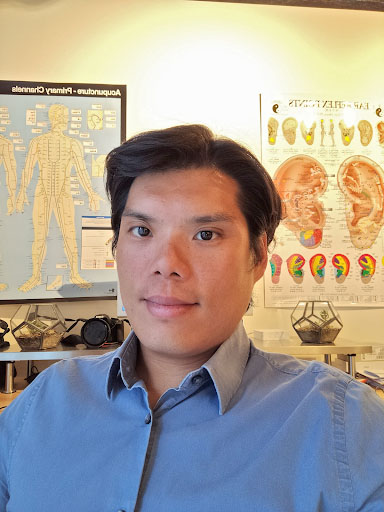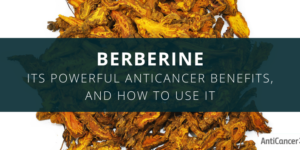When you get diagnosed with cancer, the first decision you’ll have to make is how you want to approach your case. Some may decide to do 100% conventional care. Others may decide on fully alternative treatments.
But for many of you, an integrative approach to your cancer treatment may make the most sense to you.
However, finding comprehensive care isn’t always easy when you’re talking about integrative cancer treatments. There are basically a handful of cancer centers across the country that offer integrative care at this time. And you may live too far away from one of these hospitals or clinics for them to be a practical choice.
And perhaps even more importantly… different hospitals and clinics can also differ greatly in terms of how “integrative” their program really is.
In other words, one “integrative treatment” may consist mostly of conventional treatments. In cases like this, the natural and/or holistic methods are only used for side effects.
Then, you may find another “integrative treatment” that uses a variety of natural and/or holistic methods to help against the side effects as well as against the cancer.
So maybe you’re having difficulty finding integrative cancer treatment near you.
Or maybe the “integrative treatments” available to you rely too heavily on conventional treatment for your liking.
If this describes what you are going through, we’ll show you a unique and powerful approach that is available to you now. And most importantly, you can utilize this approach from the comfort of your own home and integrate it with your local oncologist’s treatments.
An Integrative Approach To Cancer Has Many Advantages
Many of you may have already made the decision to start with an integrative approach for your case. If that’s the case, I wanted to talk about some of the advantages of an integrative approach to reinforce your decision.
But… if you haven’t quite made the decision yet, let’s talk more about why an integrative treatment may be the best option.
The biggest benefit of integrative treatment is that you can “pack more anticancer factors into your treatment schedule.” Here’s what I mean by this…

Let’s say you’re getting chemotherapy treatment for 1 day, every other week. And let’s say these chemotherapy drugs are basically out of your system in about 3 days after your infusion. This leaves you with 11 days where you’re no longer being directly supported against the cancer. And, the chemotherapy may also cause immunosuppression, leaving you without the support of your immune system also.
Of course, the impact of the chemotherapy drug can certainly last for more than the 3 days that the drugs are in your body. But at this point, you wouldn’t have any “direct” anticancer factors in place. And, it’s partly the toxicity of many of these oncology medications that limit them in terms of more frequent use.
But with an integrative approach to cancer, you can add additional anticancer methods on these 11 days between chemotherapy infusions. Most importantly, many of these methods have shown great potential against cancer, and are generally very safe to use.
Let’s talk about some examples of these anticancer substances.
Many Natural Anticancer Substances Show Great Potential
In 2014, researchers collaborating from a variety of institutions including the Hormel Institute at the University of Minnesota tested clove extracts against a commonly used chemotherapy drug called 5 fluorouracil (5FU.)
What they found was that the clove extract actually outperformed 5FU in this particular experiment conducted in mice. You can see this in the graphic below, where the tumor grew significantly more in the mice given 5FU, compared to the mice given the clove extract [1].
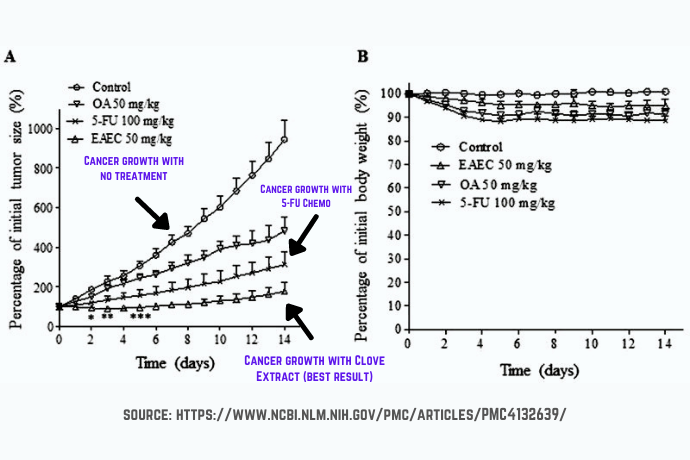
Here’s another example from researchers at the Jiangsu Province Hospital in China. These researchers tested the anticancer activity of 4 different natural anticancer substances, betulinic acid, honokiol, parthenolide, and ginsenoside. These substances can be found in birch bark, magnolia bark, feverfew herb, and ginseng.
These researchers also tested these anticancer substances in combination (i.e. “cocktail therapy,” in the graphic below,) and compared them to a common chemotherapy drug, cisplatin.
Most importantly, they also tested the natural combination in liposome form. Liposomes are formed by fat and protein, and are used as a way of increasing absorption for many supplements, as well as pharmaceuticals.
So what these researchers found was that all of these anticancer substances had some significant anticancer effects. And, when you combined them together, they had an even greater effect.
And most importantly, when they combined these natural anticancer substances together in a “liposomal form,” it had an even greater effect… similar to that of cisplatin chemotherapy [2].
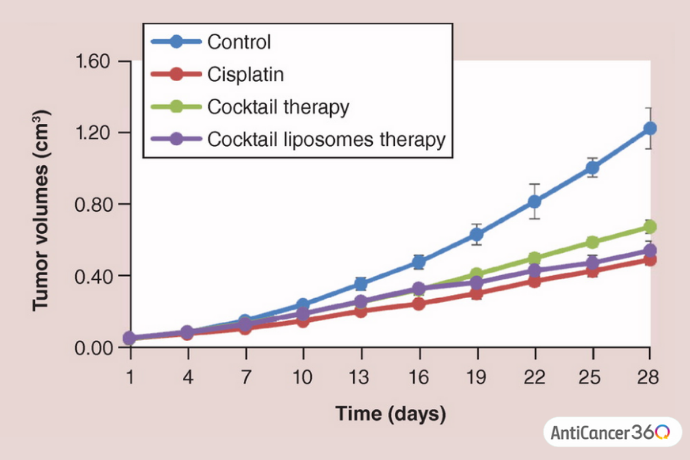
In another study conducted by researchers at Pitié-Salpêtrière University Hospital In France, researchers tested the combination of alpha lipoic acid and hydroxycitrate in an animal model of cancer. What they found was that the anticancer effects was also similar to those of 2 chemotherapy drugs, cisplatin and 5FU [3].
Beyond this, they did not find any toxicity for these substances when given to mice without cancer. And, they found these benefits across 3 different types of cancer cells… bladder cancer, melanoma, and lung cancer cells.
As you can see, many of these natural anticancer substances show a lot of potential for benefit.
Natural Anticancer Methods Can Be Added To Conventional Treatments
Here’s another important point. At the end of their research paper, these French researchers state, “This preliminary study suggests that this combination of drugs is efficient against cancer cell proliferation both in vitro and in vivo. A clinical trial is warranted.”
And when they say “combination of drugs” they actually mean the combination of alpha lipoic acid and hydroxycitrate, which are technically nutritional supplements in the United States.
Alpha lipoic acid is readily available, and hydroxycitrate is the active ingredient in an herbal supplement called “garcinia cambogia.”
But they also say that “A clinical trial is warranted.” And herein lies the problem.
There are many studies like this one where natural, non toxic substances show great anticancer potential… sometime outperforming standard oncology drugs in preclinical studies.
Yet, basically none of these studies ever go on to the clinical trial phase. So we never really know how beneficial these methods can be.
So this is why we don’t advocate an “alternative approach.” There’s just not enough science available for us to do that.
However, as you can see from these studies above, many of these natural substances do have great potential for benefit. And most importantly, many of these substances are known to be generally safe to use.

Because of this, we advocate an Aggressive Integrative Approach, where these high potential substances are used in addition to (not as a replacement for) conventional cancer treatments.
And when you integrate these methods properly, you can get the proven foundation of conventional cancer treatments, and the great anticancer potential of these natural anticancer substances in addition.
This is what I mean by “packing more anticancer factors into your treatment schedule.” Because rather than just getting chemo once every other week (where you’d have 11 days without any direct support…) you can add things like the clove extract, alpha lipoic acid, hydroxycitrate, and a variety of other anticancer substances on your “off chemo days.”
And these are only a FEW of MANY anticancer substances and combinations that we can use to support your body during these time periods in between chemo treatments.
Integrative Cancer Treatment Can Be Hard To Find and Can Differ Greatly
So for those of you who’ve decided on getting integrative cancer treatment, you may have stumbled upon the next obstacle, which is, actually finding and/or choosing a provider for your integrative care.
The first issue is that there are very few hospitals that offer integrative care at this time. Some of the major cancer institutes offer integrative medicine for their cancer patients. Examples include Memorial Sloan Kettering Cancer Center, MD Anderson, Cancer Treatment Centers Of America, Osher Center For Integrative Health (UCSF,) and Abramson Cancer Center (UPenn.)
But for many people, traveling to one of these hospitals would be very impractical.

Another issue is that many of these integrative programs are very “conservative” in terms of the natural medicines they choose to include. In most cases, the natural methods are just used for side effect support, and/or to support other aspects of the patient’s overall health.
And in cases like this, you wouldn’t be getting the “anticancer potential” of these natural substances like we showed you in the studies earlier.
Overall, if your cancer is not that advanced, and it’s known to be quite curable with conventional medicine alone… then one of these more “conservative” integrative programs may be a great choice.
But, as we talk about in our blog post on our Aggressive Integrative Approach, the more difficult your cancer is, the more it makes sense to take a more experimental integrative approach to your particular case.

So, aside from going to a major cancer institute that also uses integrative medicine, another option would be to find a local practitioner who can help you with the natural medicine side of things. This can definitely be a viable option…
But… there are many “in’s and out’s” that you have to be aware of. And things can get quite complex when you’re talking about integrating properly with conventional cancer treatments.
Let’s talk more about this…
Proper Integration Between Natural And Conventional Methods Can Be Complex
In general, integrating an anticancer protocol with conventional treatments can be much more complex than designing the anticancer program itself. The main issue is that there are many potential drug interactions that one must be aware of.
For example, if you combine the wrong supplements with a certain oncology medication, you can actually cause the medication levels in your body to become too low or too high. If the levels become too low, you won’t get the anticancer benefits of the medication. If the drug levels become too high, you’d be at risk of increased side effects, and this could even put your life at risk in some cases.
Some supplements could also decrease the effectiveness of certain oncology medications and treatments.
Another common issue is that some supplements can actually increase the risk of bleeding. And you have to be really careful with this since some oncology medications can also have this same effect.
And these are just some of the many possible interactions that can occur.
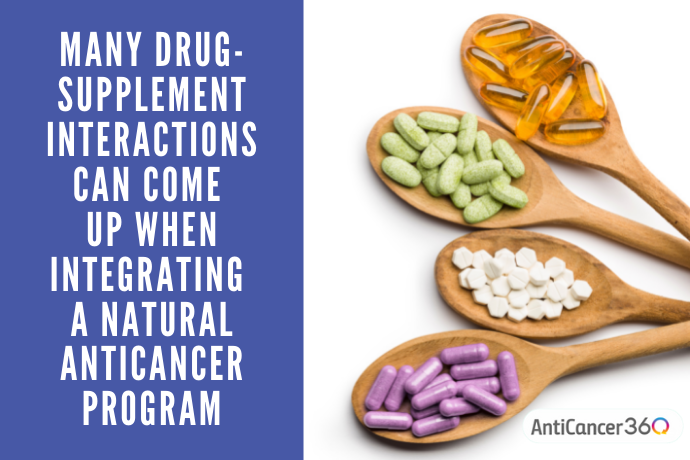
This complex array of possible drug interactions are why we have pharmacists on our team. Our pharmacists have developed specific expertise in terms of supplement – drug interactions, and we work with them closely on every case.
It’s also important to note that our pharmacists understand how to “tightly integrate” natural substances with conventional medicines.
In other words… a standard hospital pharmacist may recommend that you avoid a certain supplement since it could interact with one of your medications.
But, our pharmacist may recommend waiting until 3 days after your chemo infusion before starting the supplement, since the medication will be mostly out of your body at that point.
So as you can see, there are many complexities when it comes to integrating natural supplements with oncology medications. And whatever path you choose, it’s important that your provider has the knowledge, and/ or the team in place to deal with these types of scenarios.
There Are Many Powerful Methods Available To You Now (Wherever You Are)
So as you can see, there are many factors that need to be considered when deciding on integrative cancer treatment. And it’s important to consider all of your options before making a decision.
So, whether you’re having issues finding a provider in your area… or maybe you don’t quite resonate with the providers that you can find… just know that you do have options available to you, wherever you are.
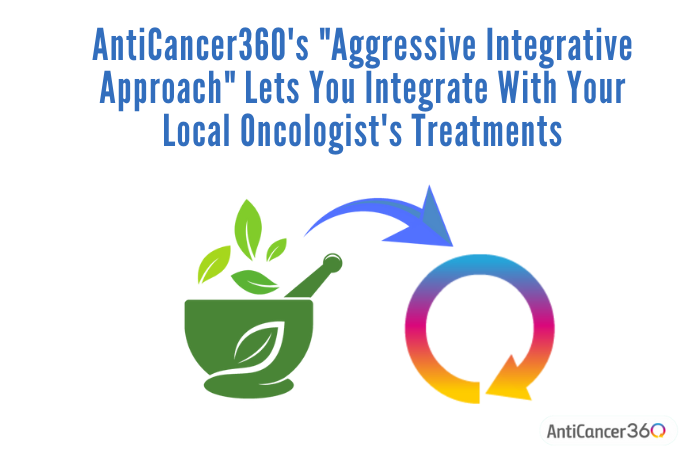
Overall, with AntiCancer360’s “Aggressive Integrative Approach,” our goal is to fight cancer from every possible angle. This approach includes integrating natural supplements to fight cancer based on available evidence, despite limited human data, and doing it in a safe way that won’t interfere with your oncology treatments.
So now, what are your thoughts about taking an integrative approach for your case? Have you run into any obstacles in the process? We would love to hear from you. Feel free to let us know in the comments below!
Want To Work With Us?
If you’re interested in using our Aggressive Integrative Approach for your case… you can learn more about our program by watching our free online webinar.
Then at the end of the webinar, you’ll be able to schedule a free call with us so that we can discuss your case in more detail.
Please discuss the risk-versus-benefit potential with your healthcare professional before starting any natural supplements, diets, and/or therapies.
Gene Wei is a Board Certified Doctor of Oriental Medicine in the state of Florida, and the founder of AntiCancer360. He’s also a graduate of the University of California Los Angeles, and East West College of Natural Medicine.
His practice is focused on integrative and natural anticancer strategies. Over the years, he’s helped many people overcome difficult cancers… including some cases of “terminal cancer” which were able to be reversed with an “Aggressive Integrative Approach.”




